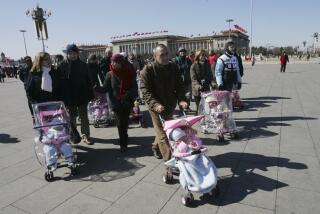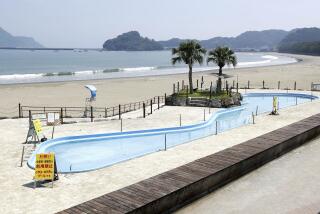Culture : Earthquake Upsets Traditional Attitudes on Adoption : Hundreds of Japanese offer to take in orphans regardless of bloodlines or wish to preserve lineage.
- Share via
KOBE, Japan — When a massive earthquake ripped apart the earth and sent thousands of people to their deaths last month, Hiroko Yonezawa and Emiko Matsumoto shared the same thought: There were sure to be scores of children orphaned by the early-morning disaster.
Both Yonezawa, a caseworker for a volunteer adoption agency, and Matsumoto of the city’s Child Guidance Center, battened the hatches and prepared for a flood of children who would need new homes and parents.
As it turned out, few children have been orphaned by the quake. Earlier reports that there could be as many as 1,100 were based on pure speculation; only two had been confirmed as of last week.
But in what the social workers say reflects a remarkable change in Japanese attitudes toward orphans, what did surface were hundreds of people calling to adopt any who might turn up.
The outpouring of offers to take in children regardless of blood ties offered striking evidence that the culture’s past values to protect and perpetuate the family lineage is gradually fading--particularly in urban areas, Yonezawa said. Although family lineage was originally a concern only of the elite samurai class and not the common people--who did not even have last names until the late Edo period of the 1800s--the value gradually took hold throughout the nation as such class distinctions diminished.
As a result, people would commonly protect the purity of family bloodlines by background checks into potential spouses--some still do--and reject any with a history of mental illness, for instance, or ties to an outcast class. Amid such practices, there was little inclination to take in orphans whose family histories were unknown.
But amid rapid urbanization, such values are changing, Yonezawa said. Her group, the Kobe Assn. for Family Protection and Promotion, has spearheaded efforts to alter Japanese attitudes toward adoption since its formation in 1960.
“Twenty years ago, people still wanted to protect their family lineage. If they adopted at all, they would request a child of good background to succeed to the family name,” Yonezawa said.
“But that way of thinking has gradually disappeared,” she said. “Now, Japanese have come to adopt a lot of different types--children whose parents have criminal records or psychological problems. A lot of people now say they just want to have the pleasure of the parenting experience.”
Indeed, in other indications that the emphasis on lineage is fading fast, most Japanese now say if they could have only one child they would prefer a daughter to a son. With infanticides of baby girls still occurring in South Korea and China, Japan may well be the only traditionally Confucian nation that has de-emphasized the importance of the male heir.
Since the earthquake, Yonezawa’s group has been deluged with more than 200 offers to adopt from the Kobe-Osaka area alone. Most of the offers have come from Japanese, but they have also come from overseas--including one from Jack Osborne, president of Mitsubishi Consumer Electronics America.
But to the surprise of caseworkers here, only a few orphans have surfaced so far. Matsumoto, of Kobe’s child guidance center, said more might materialize when friends or relatives now taking care of orphans find the burden too heavy.
She surmised, however, that since the earthquake occurred when most families were sleeping--and most Japanese mothers sleep near their children if not with them--it was unlikely that only the parents would be killed.
Among the 27 children at one orphanage, for instance, most were temporarily deposited by a single surviving parent while he or she sought work or new housing.
Other children, such as 9-year-old Yuji Fujii, wait for parents to come for them. He was brought to the Shinai Children’s Home here after the earthquake killed his grandparents. He had lived with them since infancy after his mother left him in their care; his father lives somewhere in the area.
In Japan, it is very difficult to adopt children whose parents are still alive, Yonezawa said. Relatively few parents are willing to sign the requisite release because they believe that it will be easier to visit their child in an institution rather than a foster family, should the spirit move them, she said.
Meanwhile, courts are reluctant to take away parental rights, even if a child has been left in an institution for 10 years.
“There is no real system to take away parental rights, because it’s felt that someday the parenting desire might come back,” she said.
Nationwide, there are more than 8,000 people officially registered as would-be foster parents. In the Kobe area, 700 people are on the waiting list for children. Children with different nationalities or disabilities are still difficult to place, Yonezawa said.
Although 1,654 adoptions were officially registered in Japan in 1993, officials believe that many more took place between private parties, which are not legally required to be reported.
Among adoptions that do occur, parent abandonment, divorce or illness are the three main reasons for giving up the child. Recently, however, there has been an increase in unmarried women giving up their children, Yonezawa said.
“We’re using volunteers to put up posters and say we’re ready to take care of any orphans--if only they would appear,” Yonezawa said.
More to Read
Sign up for Essential California
The most important California stories and recommendations in your inbox every morning.
You may occasionally receive promotional content from the Los Angeles Times.














